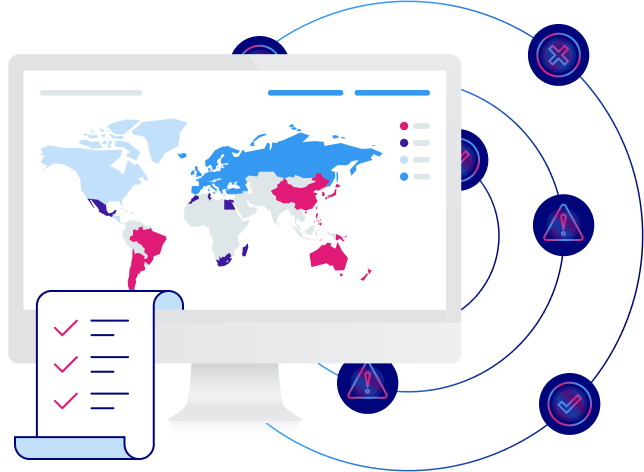-
Solutions
- AI Governance
- AI Risk
- Geo-Specific Cookie Banner
- Consumer Preference Management
- Data Subject Request Automation
- Data Mapping and Vendor Risk Management
- Privacy, Vendor, and Risk Assessments
- Privacy Program Management
- Regulatory Guidance
- Privacy Program Consulting
- Certifications and Verifications
- International Data Transfers
Forrester TEI ROI of Privacy ReportTrustArc commissioned a Forrester study to analyze the potential benefits of using our platform and the Forrester team found ROI linked to efficiency, compliance, and decreased cost in data breaches.
Read the report -
Products Products Privacy Studio Overview
Automate consent and data subject rights compliance. Design seamless privacy experiences to enhance customer trust across your digital landscape.
- Cookie Consent Manager Effortlessly manage cookie consent for global compliance, ensuring a secure, personalized browsing experience.
- Consent & Preference Manager Easily manage and orchestrate customer consent and preferences across brands and channels.
- Individual Rights Manager Automate and streamline DSR workflows to ensure compliance and show your commitment to customer rights.
- Trust Center Quickly centralize, manage, and showcase all trust and safety information in an easily customizable, no-code hub.
Products Governance Suite OverviewStay ahead of privacy and compliance regulations. Simplify data privacy management and ensure data governance with cutting-edge apps.
- PrivacyCentral Centralize privacy tasks, automate your program, and seamlessly align with laws and regulations.
- Data Inventory Hub & Risk Profile Gain full visibility and control of your data and accurately identify and mitigate risks.
- Assessment Manager Automate and score privacy assessments like PIAs and AI Risk, streamlining your compliance workflow.
- Nymity Research Get instant access to the latest in privacy regulations, legal summaries, and operational templates.
Products Assurance Services OverviewGain trust and credibility with leading privacy certifications from unbiased experts, backed by technology for unmatched privacy compliance assurance.
- Dispute Resolution
- TRUSTe Enterprise Privacy Certification
- TRUSTe EDAA Privacy Certification
- TRUSTe APEC CBPR and PRP Certification
- TRUSTe Data Collection Certification
- CCPA/CPRA Validation
- Data Privacy Framework Verification
- GDPR Validation
- Digital Advertising Alliance Validation
- TRUSTe Responsible AI Certification
-
Regulations
- EU General Data Protection Regulation (GDPR)
- California Consumer Privacy Act (CCPA)
- Virginia Consumer Data Protection Act (CDPA)
- NIST AI Framework
- ISO/IEC 27001
EU Artificial Intelligence Act (EU AI Act)EU's regulation on the use of AI and the world's first comprehensive AI law.
Learn moreData Privacy Framework (DPF)Transatlantic data transfer mechanism for EU-U.S., UK, and Swiss-U.S. commerce.
Learn more - Resources
- Contact us
EU Cloud Code of Conduct
The EU Data Protection Code of Conduct for Cloud Service Providers sets out clear requirements and recommended procedures for data protection in cloud services in compliance with GDPR to support accountability.
Are you subject to the EU Cloud Code of Conduct?
The EU Cloud Code of Conduct applies to all cloud services types in the market that is acting as a processor.
Expectations of the Code
The Code is meant to facilitate effective application of the GDPR and is designed to ensure a robust level of data protection and transparency, complemented by an independent monitoring function.Subprocessing guidance
Under the Code, cloud service providers must provide consent on authorized use of sub-processors as well as disclosures on changes.
Data subjects rights
The Code requires a data protection contact in order to assist in data subject rights outlined in GDPR. In addition there are specifics on the return or deletion of customer personal data upon termination of a cloud service agreement.
Best practice & oversight mechanisms
The Code outlines security objectives based on recognized standards (e.g., ISO 27001, ISO 27701, SOC 2, C5). For oversight mechanisms, a monitoring body must be able to perform independent reports. Cloud service providers should also provide a complaint mechanism and monitoring body in accordance with GDPR.

EU General Data Protection Regulation (GDPR)
The world’s most comprehensive data privacy and protection law requires organizations to adhere to 7 common principles, provide the ability to exercise the 8 individual rights, and demonstrate an ongoing commitment to data privacy.
Achieve compliance with TrustArc
-
Compliance management Identify gaps and track compliance. PrivacyCentral assesses regulation specifics and automatically provides guidance on building out a sustainable privacy program.
-
TRUSTe validation Get an independent review by TRUSTe to validate and report on your GDPR compliance efforts as a subprocessor.
-
Guidance and operational templates Stay ahead with expert guidance and best practices. Operationalize quickly with expert written operational templates for sample policies, checklists, procedures, and more.

The information provided does not, and is not intended to, constitute legal advice. Instead, all information, content, and materials presented are for general informational purposes only.




